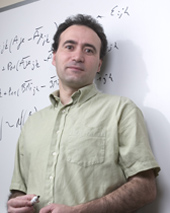Skip to content. | Skip to navigation
Personal tools

- Contact Us |
- Seminars |
- Donate

Lunenfeld-Tanenbaum
Research Institute
Mount Sinai Hospital
Joseph & Wolf Lebovic Health Complex
600 University Avenue
Toronto, Ontario
M5G 1X5
Tel.: 416-586-4800 ext.8863
► The Prosserman Centre for Population Health Research
► Web of Science Researcher ID
A-2941-2013
Dr. Laurent Briollais
SENIOR INVESTIGATOR
Biostatistician and statistical geneticist Dr. Laurent Briollais develops new statistical methods and designs to study cancer and other complex human disorders. In particular, he aims to identify the genetic and environmental factors that cause these diseases in order to improve prevention and treatment.
With an ever-increasing volume of data generated by large-scale genetic and genomic studies, Dr. Briollais' team faces important challenges in order to provide meaningful statistical results that can then be interpreted by the biologists and lead to critical clinical applications. Dr. Briollais and his team lend their expertise to colleagues internationally, and play a critical role in the development and analysis of large-scale population studies to determine genetic and environmental factors that contribute to a variety of complex human diseases.
Within the Lunenfeld-Tanenbaum, Dr. Briollais works with colleagues to study the genetic susceptibility to breast cancer that aims to improve our understanding of this disease and to better predict its risks in the general population. As part of an interdisciplinary CIHR team grant chaired by Dr. John McLaughlin on the determinants and impact of colorectal cancer, he is leading a statistical group to develop analytical methods in relation to the various projects of this research.
With Dr. Stephen Lye at the Lunenfeld-Tanenbaum as well as international collaborators in Australia, Dr. Briollais revealed in a groundbreaking study published in November 2012, that the length of time a baby is breastfed positively impacts the effects of the fat mass and obesity gene (FTO) in young adults. The study followed children in Western Australia from birth to 14 years of age, and found that breastfeeding can help reverse the effects of the FTO gene variant if a child is exclusively breastfed for at least three months.
Dr. Briollais is also developing specific statistical methods to elucidate the role of gene-environment interactions underlying the development origin of health and adult diseases. Finally, he has recently been awarded a MITACS grant to develop a graphical modeling framework to study complex dependence patterns in high-dimensional biological data.
At a Glance
Dr. Laurent Briollais uses and develops complex statistical tools to model the effects of genes and environmental factors associated with complex human diseases
Identifies genomic variations that best predict breast cancer risks
Major Research Activities
Dr. Laurent Briollais' research program focuses on the development of statistical methods and study designs to identify and characterize genetic and environmental risk factors that influence complex human diseases at the population level. Recently, he has been working on the development and application of innovative computational and statistical approaches to identify genomic variations and their interactions that best characterize and predict breast cancer risks. This work is done in collaboration with molecular geneticists, clinicians and epidemiologists at the Lunenfeld-Tanenbaum.



